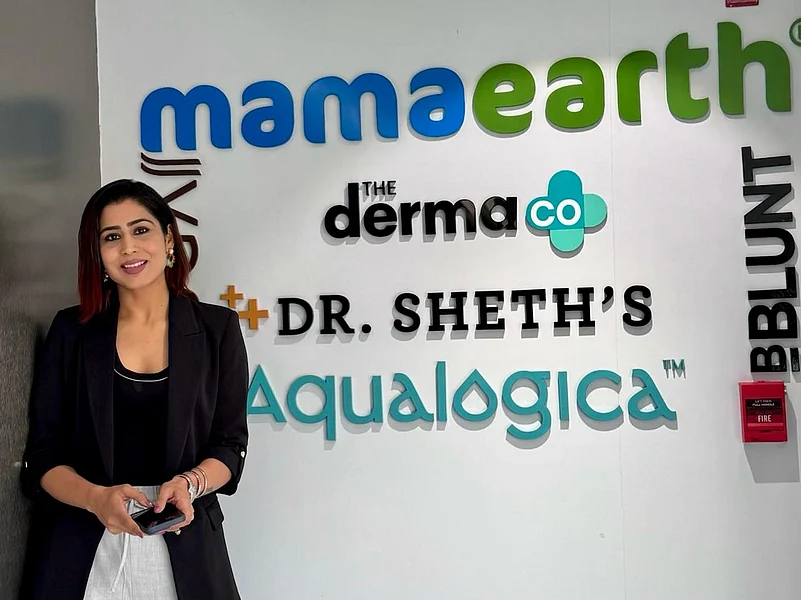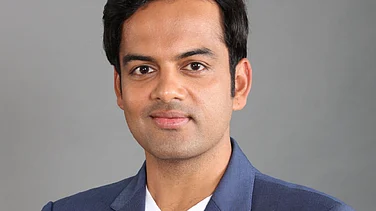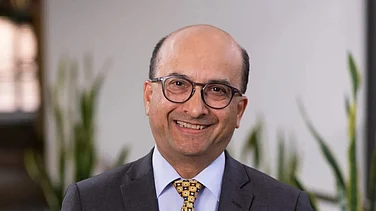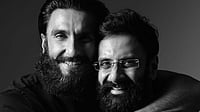International Women's Day is celebrated across the world annually on March 8. On this occasion, Honasa Consumer cofounder and CIO Ghazal Alagh had an exclusive interaction with Outlook Business and shared her journey as a woman entrepreneur in the beauty and personal care industry. She notes how women bring empathy and problem-solving instincts to consumer-centric businesses.
As a woman entrepreneur in the beauty and personal care industry, what challenges did you face while building Honasa Consumer's umbrella, and how did you overcome them?
Building a business from the ground up, especially in an industry dominated by legacy brands, is never easy. The challenges weren’t just operational - they were also about shifting mindsets. When we started, the idea of toxin-free, ingredient-conscious BPC (beauty and personal care) products wasn’t mainstream. Consumers were used to conventional formulations, and there was a gap in awareness around what went into their personal care products.
I remember countless conversations explaining why ingredients matter, why transparency is key, and why homegrown brands can stand alongside global giants. Skepticism was inevitable, and there were moments of doubt, but our conviction in the change we wanted to create kept us going. There were times when we were questioned but what kept us going was our conviction in the change we wanted to create.
Scaling was another challenge. Growth isn’t just about launching products; it’s about building trust. Every expansion, whether into new categories, offline retail, or international markets, needed to stay rooted in the same ethos we started with. The way we navigated this was by staying obsessively consumer-focused. We listened, we adapted, and we built solutions that were driven by real needs rather than industry trends.
Many women struggle with balancing entrepreneurship and family life. How did you navigate this journey, and what advice would you give to others?
I get asked this a lot, and I won’t sugarcoat it - it’s hard. The idea of “having it all” sounds great, but in reality, it’s about making conscious choices every day. There were moments when my family felt neglected, and times when work took every ounce of my energy. But I’ve learned that balance isn’t about perfection, it’s about being fully present in whatever role you’re in.
What has helped me is being intentional with my time. When I’m at work, I give it my all. When I’m with my family, I try to be fully present. In today’s hyper-connected world, setting boundaries takes real effort, but it’s necessary. I’ve also realized that having a strong support system is crucial. As women, we often feel the pressure to do it all, but asking for help whether from family, colleagues, or mentors is not a weakness.
For women navigating this, my advice is simple: Define what balance means to you. It’s different for everyone. Let go of unrealistic expectations and create a rhythm that works for you. And most importantly, don’t let guilt take away from the joy of either role befcause you deserve both.
A 2024 study found that 75% of working mothers suffered a career setback of one to two years after taking maternity leave. How can start-ups play a role in resolving this issue?
This is heartbreaking but unfortunately not surprising. For too long, maternity has been seen as a career pause rather than a natural part of a woman’s professional journey. The real issue isn’t just the break itself - it’s how workplaces perceive and accommodate it. Start-ups, in particular, have the ability to change this. Unlike traditional organizations, they have the agility to create policies that are truly inclusive. I remember a time at Honasa when we had six pregnant women in the office at the same time. We made sure they had the flexibility they needed, and our existing creche tie-ups provided additional support. These aren’t just benefits; they’re the foundations of a workplace that truly values women.
A bigger shift needs to happen in leadership mindsets. I’ve had conversations with new mothers who worried about their roles post-maternity, and my response has always been the same: motherhood isn’t a setback. If anything, it makes you stronger. I’ve seen mothers return with sharper focus, resilience, and efficiency - qualities any workplace should value. Promotions and career growth shouldn’t pause just because someone took time to bring a life into the world.
With an increasing number of women leading D2C brands, do you think female entrepreneurs bring a unique perspective to consumer-centric businesses? If so, how?
Absolutely! Women bring an innate sense of consumer empathy. We don’t just create products; we craft solutions to real-life problems, often ones we’ve experienced firsthand. Take Mamaearth, for example. As a mother, I was searching for safe, toxin-free products for my child, and that need turned into a brand that resonated with millions of parents. This kind of intuitive problem-solving is what sets many women-led businesses apart.
Consumers today aren’t just looking for products; they seek brands they can relate to - ones that foster trust, authenticity, and shared values. Some of the most successful brands in beauty, health, and wellness were born out of personal experiences. When you’ve lived the problem
You’re solving, your approach becomes more meaningful, more instinctive, and that’s what truly connects with consumers.
You recently spoke about how toxic workplaces stem from toxic managers. In your experience, what are the key traits of a good leader that can help foster a healthy and productive work culture?
Work culture isn’t shaped by policies; it’s shaped by people, and leadership plays the biggest role in that. A toxic workplace often stems from leaders who fail to foster trust, growth, and collaboration.
Empathy is key. A good leader listens to their team’s challenges, motivations, and needs. Trust is just as important; great teams thrive when they’re empowered, not micromanaged. If you’ve hired someone, trust them to own their work, give them autonomy, and create space for their ideas.
And finally, accountability. Leaders set the tone, not just for their teams but for themselves. If you expect integrity, honesty, and collaboration, you have to embody those values first. A company’s success is built on its people, and when they feel valued and inspired, real, lasting growth follows.
Women-led businesses are growing, but funding disparities still exist. What advice would you give to aspiring women entrepreneurs seeking investment?
Raising funds as a woman entrepreneur often means proving yourself twice as much. Sure, numbers speak, but conviction speaks louder. Investors bet on confidence, clarity, and resilience. Irrespective of gender, one needs to know their business inside out and own their narrative. Investors back clarity, confidence, and resilience. They bet on founders who don’t just talk about potential but show relentless execution.
And most importantly, choose your investors as wisely as they choose you. Capital should come with alignment, not just funding. Build relationships, expand your network, and remember that rejections are redirections. Every “no” is just a step closer to the right “yes.”
Many women struggle with self-doubt in their professional journey. As an entrepreneur, you must have experienced this at Honasa Consumers too. How did you overcome your own moments of doubt and uncertainty?
Self-doubt is a quiet voice that creeps in when no one is watching. I’ve felt it in the early days when we were trying to carve out a space in an industry dominated by legacy brands. I’ve felt it before making big decisions, when the weight of responsibility felt overwhelming.
The only way to silence it is to keep moving. Every time I questioned myself, I went back to my “why.” Why did we start? What problem are we solving? Who are we helping? That clarity became my anchor. Having the right people around you matters too. Having a strong team, mentors, and a support system can turn hesitation into confidence that no matter the challenges, you will figure it out.
So to every woman battling self-doubt - don’t wait for it to disappear. Move forward with it, let action drown out the noise, and trust that every step you take, no matter how uncertain, is still a step ahead.
On Women’s Day, what message would you like to give to working mothers who aspire to build their own ventures?
To every mother who dreams of building something, remember your ambition and your motherhood are not competing forces. They are your superpowers. There will be tough days, moments of exhaustion and doubt. But here’s the truth, motherhood doesn’t weaken you, it teaches you patience, resilience, and the art of managing chaos - skills every entrepreneur needs.
You don’t have to choose between being a great mother and a great founder. You can be both, in your own way, at your own pace. Let go of the guilt. Define success on your own terms. And most importantly, start.




























